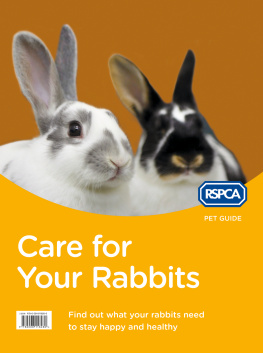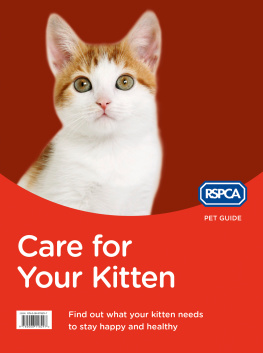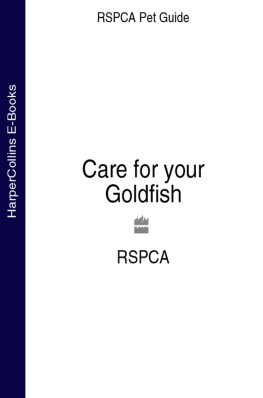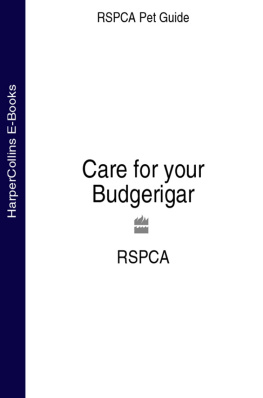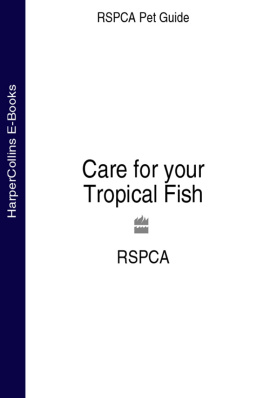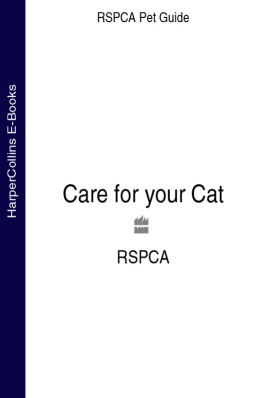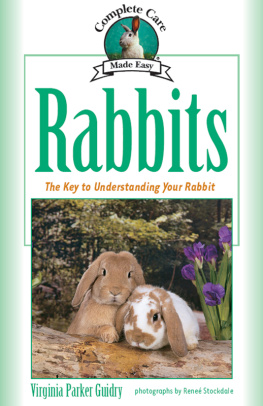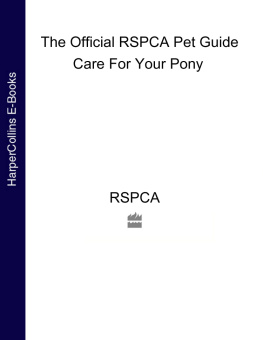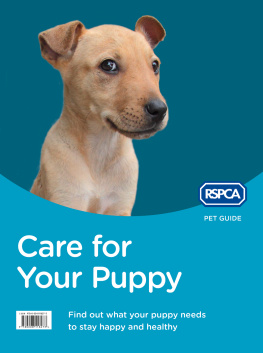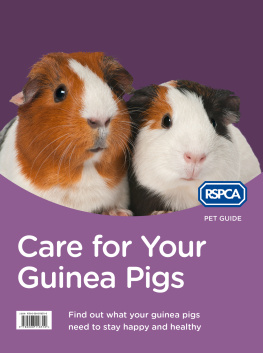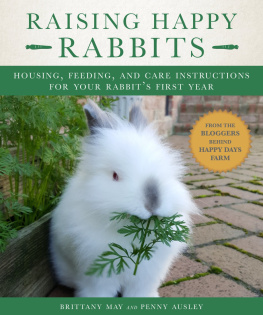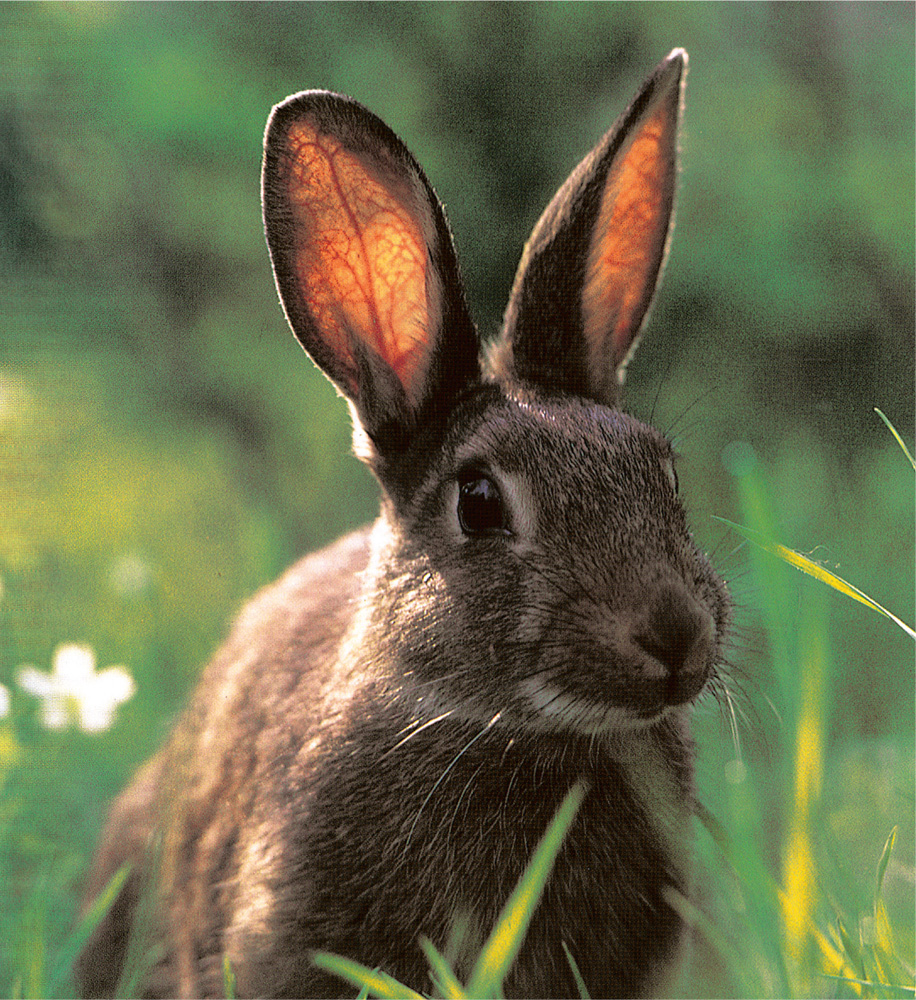HarperCollinsPublishers
1 London Bridge Street
London SE1 9GF
www.harpercollins.co.uk
First published 1985 as Care for your Rabbits by William Collins Sons & Co Ltd
This new edition published 2015
Royal Society for the Prevention of Cruelty to Animals 2015
RSPCA name and logo are trademarks of RSPCA used by HarperCollinsPublishers Limited under licence from RSPCA Trading Limited. From every book sold 5% of HarperCollins proceeds from sales will be paid to RSPCA Trading Limited which pays all of its taxable profits to the RSPCA. Registered in England and Wales, Charity No. 219099
www.rspca.org.uk
The RSPCA is registered in England and Wales, Charity No. 219099
www.rspca.org.uk
Front cover image: RSPCA
This book has been compiled on the basis of expert advice and scientific research. To the best of our knowledge it is correct at the time of going to press. The information contained in this book is intended only as a guide. If you are unsure, or you have any concerns about your pet(s), you must speak to a vet, who will be able to give you advice that is appropriate for your individual animal(s).
The Animal Welfare Act 2006 applies to England and Wales. Similar separate legislation covers Scotland and Northern Ireland, so owners must fulfil the same legal duties of care.
A catalogue record for this book is available from the British Library
All rights reserved under International and Pan-American Copyright Conventions. By payment of the required fees, you have been granted the non-exclusive, non-transferable right to access and read the text of this e-book on screen. No part of this text may be reproduced, transmitted, downloaded, decompiled, reverse engineered, or stored in or introduced into any information storage and retrieval system, in any form or by any means, whether electronic or mechanical, now known or hereinafter invented, without the express written permission of HarperCollins.
Source ISBN: 9780008118280
eBook Edition April 2015 ISBN: 9780008119225
Version: 2015-04-16
Contents
Owning rabbits can be incredibly rewarding and a great source of companionship. Pets can provide opportunities for social interactions, helping people feel less lonely and isolated. Growing up with pets also offers health benefits, and caring for an animal can help improve a childs social skills, encouraging the development of compassion, understanding and a respect for living things. Having rabbits is, however, a huge responsibility and requires long-term commitment in terms of care and finances.
Before getting rabbits, it is important that time is taken to discuss the commitment and care required with all family members, and that everyone agrees to having and looking after rabbits. Bear in mind that once you have your rabbits there is a legal requirement under the Animal Welfare Act 2006 to care for them properly, so you must be sure that you will be able to do this throughout your rabbits life. This means providing somewhere suitable for them to live, a healthy diet, opportunities to behave normally, the provision of appropriate company, and ensuring that they are well.
If you are able to care for rabbits properly and make the decision to go ahead, then please consider giving a home to some of the many rabbits currently in the RSPCAs animal centres throughout England and Wales.
This book is based on up-to-date knowledge of rabbit behaviour and welfare approved by the RSPCA. It has been written to provide you with all the care information you need to keep your rabbits happy and healthy throughout your lives together.
We hope you enjoy it.
Samantha Gaines BSc (Hons) MSc PhD
Alice Potter BSc (Hons) MSc
Lisa Richards BSc (Hons)
Jane Tyson BSc (Hons) MSc PhD
Animal behaviour and welfare experts, Companion Animals Department, RSPCA
Owning and caring for a pair or group of rabbits can be very rewarding. It is also a big responsibility and a long-term commitment. You will need to think carefully about lots of different things before you decide whether you are able to give rabbits the care and attention they need. Here are some of the issues you need to consider:
Rabbits have complex needs
The biology and behaviour of pet rabbits is very similar to those of wild rabbits. This means they have very complex needs and although they are traditionally thought of as good pets for children, rabbits are not easy to look after well, so an adult must always be responsible for ensuring the rabbits are properly handled and cared for. Think very carefully about whether keeping rabbits fits in with your lifestyle. You will need to make sure that you can meet all their welfare needs this includes providing suitable accommodation that is cleaned regularly, feeding them every day, as well as spending time grooming and interacting with them.
Rabbits are a long-term commitment
Typically, rabbits may live for 812 years, although some may live longer. Think whether you can afford the costs of feeding and caring for rabbits. You will need to consider meeting the expense of a suitably robust, spacious home for them, food and bedding, equipment, vet bills and insurance. There may also be additional costs if you need to pay to board them or have them cared for when you go on holiday. Remember, too, that rabbits should always be kept in pairs or groups unless advised otherwise by a vet, so the costs will need to be multiplied by the number of rabbits you plan to keep.
Rabbits are very sociable animals
This means that, as stated above, they must not be kept on their own unless a vet or qualified animal behaviourist has advised you otherwise. A good mix is a male and female who have both been neutered. Rabbits should not be kept with other animals, such as guinea pigs.
Rabbits are very active animals
They need plenty of space to hop, run, jump, dig and stretch out fully in any direction when lying down. They need an enclosure tall enough to allow them to stand up on their hind limbs without their ears touching the roof. A traditional hutch will not meet their needs, so you should make sure you have enough room for a suitable house that has permanent access to an exercise area.
The Animal Welfare Act
Under the Animal Welfare Act 2006 it is a legal obligation to care for animals properly by meeting five welfare needs. These are: a suitable place to live, a healthy diet including clean, fresh water, the ability to behave normally, appropriate company and protection from pain, suffering, injury and illness. This care guide contains lots of information and tips to help you make sure these needs are met.
Life History
SCIENTIFIC NAMEOryctolagus cuniculus
GESTATION PERIOD2834 days (approx.)
NAME OF YOUNG Kit/Kitten
LITTER SIZE Varies, average of 58 (approx.)
EYES OPEN After 711 days (approx.)
WEANING AGE After 4256 days
PUBERTY Varies with size and type of rabbit, 38 months (approx.)
ADULT WEIGHT Varies greatly, can be up to 10kg (22lbs) (approx.)

